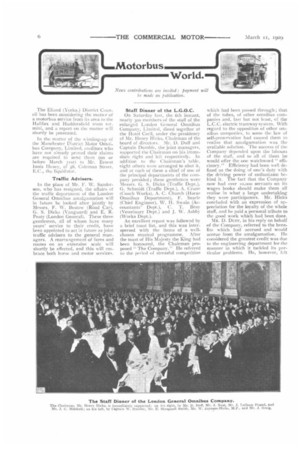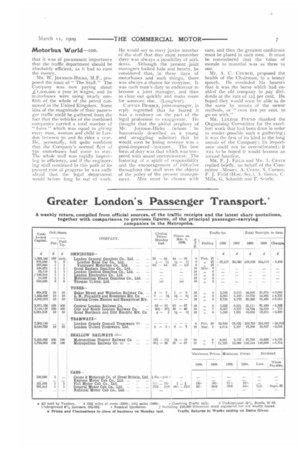Motorbus World.
Page 6

Page 7

If you've noticed an error in this article please click here to report it so we can fix it.
The Elland (Yorks.) District Council has been considering the matter of a motorbus service front its area to the Halifax and Huddersfield tram ter_ mini, and a report on the matter will shortly be presented.
In the matter of the winding-up of the Manchester District Motor Omnibus Company, Limited, creditors who have not already proved their claims are required to send them (on or before March 3 tst) to Mr. Ernest Innis Husey, of s8, Coleman Street, E.C., the liquidator.
Traffic Advisers.
In the place of Mr. F. W. Sanderson, who has resigned, the affairs of the traffic department of the London General Omnibus amalgamation will in future be looked after jointly by Messrs. F. W. Bestow (Road Car), G. S. Dicks (Vanguard) and E. R. Peaty (London General). These three gentlemen, all of whom have many years' service to their credit, have been appointed to act in future as joint traffic advisers to the general managers. A rearrangement of fares and routes on an extensive scale will shortly be effected, and this will embrace both horse and motor services.
Staff Dinner of the L.G.O.C.
On Saturday last, the 6th instant, nearly 300 members of the staff of the enlarged London General Omnibus Company, Limited, dined together at the Hotel Cecil, under the presidency of Mr. Henry Hicks, Chairman of the board of directors. Mr. D. Duff and Captain Durable, the joint managers, supported the Chairman on his immediate right and left respectively. In addition to the Chairman's table, eight others were arranged to abut it, and at each of these a chief of one of the principal departments of the corn piny presided ; these gentlemen were Messrs. 0. S. Dicks (Traffic Dept.), G. Schmidt (Traffic Dept.), A. Crane (Coach Works), A. C. Church (Horse Omnibus Department), F. Searle (Chief Engineer), W. II. Swain (Accountants' Dept.), C. T. Bray (Veterinary Dept.) and J. W. Ashby (Works Dept.).
An excellent repast was followed by a brief toast list, and this was interspersed with the items of a wellchosen musical programme. After the toast of His Majesty the King had been honoured, the Chairman proposed "The Company." He referred to the period of stressful competition which had been passed through ; that of the tubes, of other omnibus companies and, last but not least, of the L.C.C. electric tramway system. With regard to the opposition of other omnibus companies, to some the law of self-preservation had caused them to realise that amalgamation was the available solution. The success of the Company depended upon the labours of the staff, and to all of them he would offer the one watchword "efficiency." Efficiency had been well defined as the doing of one's duty with the driving power of enthusiasm behind it. The fact that the Company now had over mono servants on its wages books should make them all realise in what a large undertaking they were participators. Mr. Hicks concluded with an expression of appreciation for the loyalty of the whole staff, and he paid a personal tribute to the good work which had been done.
MR. D. DUFF, in his reply on behalf of the Company, referred to the benefits which had accrued and would accrue from the amalgamation. He considered the greatest credit was clue to the engineering department for the manner in which it tackled its particular problems. He, however, felt
that it was of paramount importance that the traffic department should be absolutely efficient, as it had to earn the money.
MR. W. Jovrisotc-HICKS, M.P., proposed the toast of " The Staff." The Company was now paying about 4:1,00o,000 a year in wages, and its motorbuses were using nearly onefifth of the whole of the petrol consumed in the United Kingdom. Some idea of the magnitude of their passenger traffic could be gathered from the fact that the vehicles of the combined cc;rnpanies carried a total number of " fares " which was equal to giving every man, woman and child in London between 70 and So rides a year. He, personally, felt quite confident that the Company's normal fleet of 750 motorbuses had come to stay. The whole staff was rapidly improving in efficiency, and if the engineering staff continued in this path at its present rate of progress he was sadly afraid that the legal department would before long be out of work. He would say to every junior member of the staff that they must remember there was always a possibility of accidents. Although the present joint managers looked hale and hearty, he considered that, in these days of motorbuses and such things, there was always a chance for everyone. It was each man's duty to endeavour to become a joint manager, and then to clear out quickly and make room for someone else. (Laughter).
CAPTAIN DUMBLE, joint-manager, in reply regretted that he feared it was a tendency on the part of the legal profession to exaggerate. He thought that the pitiful prophecy of Mr. Joynson-IIicks (whom he humorously described as a young and struggling solicitor) that he would soon be losing revenue was a good-tempered -instance. The best form of duty was that which was tempered with sound commonsense. The fostering of a spirit of responsibility and the encouragement of initiative throughout the staff were the objects of the policy of the present management. Men must he chosen with care, and then the greatest confidence must be placed in such men. It must be remembered that the value of morale to material was as three to one.
Mr. A. C. CHURCH, proposed the health of the Chairman, in a breezy speech. He reminded his hearers that it was the horse which had enabled the old company to pay dividends at the rate of 124 per cent. He hoped they would soon be able to do the same by means of the newer methods, or " even five per cent, to go on with."
MR. LULIIAM POUND thanked the Organising Committee for the excellent work that had been done in order to render possible such a gathering; it was the first of its kind in the long annals of the Company; its importance could not be overestimated; it was to be hoped it would become an annual function.
MR. F. J. FIELD and MR. A. CRANE replied briefly, on behalf of the Committee --Messrs, A. Crane, S. Curzon, F. J. Field (Hon. See.), A. Green, C. Mills, G. Sc.hmidt and F. Smile,






















